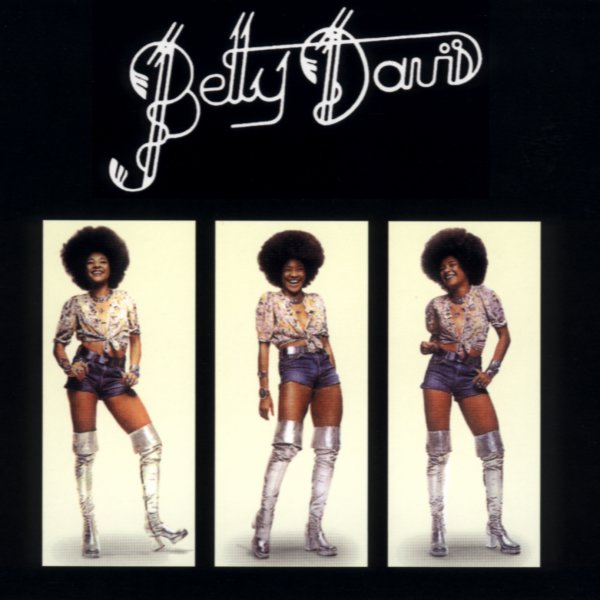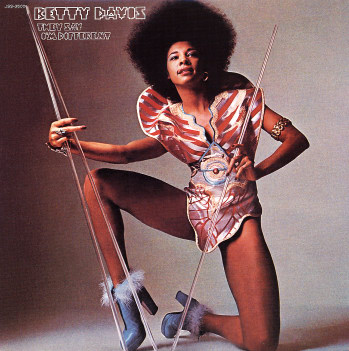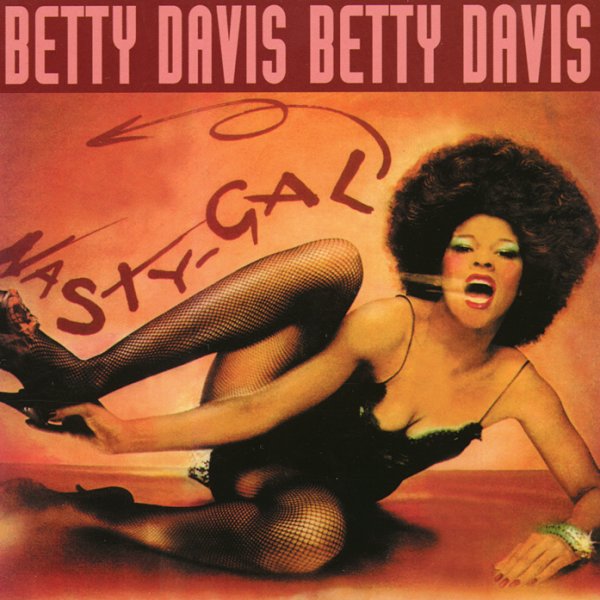




Betty Davis: Anti-Love Song
From Betty Davis (Just Sunshine, 1973)
Betty Davis: Shoo-B-Doop and Cop Him and They Say I’m Different
From They Say I’m Different (Just Sunshine, 1974)
Betty Davis: Nasty Gal
From Nasty Gal (Island, 1975)
All songs above also available on This Is It!.
I’ve been meaning to write something on Betty Davis for Soul Sides for a long time but what finally gave me an incentive was the release of Vampi Soul’s compilation, This Is It!, which, as far as I know, is the first anthology to highlight Davis’ musical career. I always thought it was strange that no one had done it sooner – though this may have had something to do with how Davis (now back to her maiden name of Mabry) is legendary for how difficult she is to reach.
All three of her albums are worth checking out, especially her first two on Just Sunshine but if you need a primer, this anthology is as good as any.
CONTINUE READING “THEY SAY SHE’S DIFFERENT”
(the following essay is adapted from a brief Critical Karaoke paper I gave at the 2004 EMP conference. I’ve added additional details at the end).
I first heard Betty Davis when I found her album Nasty Gal. On it, she’s decked out in black fishnet stockings, her legs kicked out in an aggressive dare and within moments of listening to her, she owned me. Partly, it was her voice, swinging from a seductive lilt to a jagged dagger in the blink of a bar. It was also her music, this tidal force of funk, rock and blues that could spin you dizzy or drag you in deep. Mostly though, it was her attitude – as brash and proud as her Afro, lit by the spark of youth but powered by the proverbial fury of a woman scorned.
Betty Davis didn’t sing love songs, she sung anti-love songs, but even her whispered warnings about her cruelty and cattiness couldn’t stop you from falling for her. In the space of a song, Betty could make you crawl, make you sweat and before you knew it, she held the deed to your soul.
Most of what I initially found about Betty was just mere footnote – she was known more by her married surname than as an artist in her own right. Born Betty Mabry, she’s the Mademoiselle Mabry that Miles Davis composed about and her face adorns Miles’ Filles De Kiliminjaro album. The two, separated in age by 25 years, were only married for a year but in that time, she’s credited with introducing Miles to Jimi Hendrix, who was Betty’s friend and rumored lover.
Considering Miles’ famed fusions between rock and jazz, one has to think of Betty as the bewitching inspiration behind his Bitches Brew but more than just a former First Lady of Jazz, she was also a Queen Mother of funk. Betty Davis was the missing link between Marva Whitney and Parlet, Nina Simone and the Brides of Funkenstein, not to mention the inspiration behind more recent funk fatales like Macy Gray and Kelis. However, unlike female mouthpieces for male producers and songwriters like James Brown and George Clinton, Betty wrote and arranged every song on all three of her albums and produced two herself. As she says on the title of her second album, They Say I’m Different.
Miles once said of his ex-wife that with more support and better luck, she could have been as big as Madonna and in retrospect, she had all the markings to be a huge star. Her photogenic image and flamboyant personality preceded Diana Ross’ disco diva conversion while predicting Tina Turner’s 1980s comeback. But far more than a pretty face and big hair, I was drawn to Betty for her striking songwriting, musical breadth and most of all, her blend of sass and seduction. I long adored the sentimental soul stylings of Aretha Franklin and Etta James but where they emoted, Betty inflicted. In her, I hear the wrenching misery of the gut bucket blues but Betty pours it out through funk’s cathartic energy. She tackles love and lust by shaking out frustrations and fantasies in a tremble of slapping bass lines, serrated guitar riffs, jabbing drum breaks and her own scratchy voice.
Her song titles alone – “If I’m In Luck I Might Get Picked Up”, “Nasty Gal”, and “Game Is My Middle Name” made it clear that she wasn’t penning Burt Bacharach tunes. Unlike ‘60s soul’s preoccupations with romance and heartbreak, Davis trumpeted funk’s indulgence with raw sexuality. She sang – singed really – about obsession and rapture, bragging about roughing you up, dragging you down and leaving you begging for more.
Yet, Davis was no raunchy tease – she understood that love and sex formed a blurred line that anyone was in danger of slipping into – including herself. On “Anti-Love Song,” she’s irresistibly seductive when she purrs, “No, I don’t want to love you/’cause I know how you are…/I know you could posses my body/I know you could make me crawl.” But with a wink of an eye, she turns the tables and you realize, who’s really in control: “Cause you know I could possess your body too/(don’t cha)/you know I could make you crawl/and just as hard as I’d fall for you/(boy)/well, you’d know you’d fall for me harder.” Truer words were never spoken.
The four songs I pulled are my favorite by Davis. “Anti-Love Song” is a no-brainer – it’s an incredible piece of songwriting and attitude, not to mention funky as hell. That said, I like “Shoo-B-Doop and Cop Him” even better – that bassline cannot be f—ed with and it’s such a goddamn sexy song.
“They Say I’m Different” isn’t simply a title track, it also encapsulates Betty Davis’ whole attitude and outlook. Just listen to it and you’ll see what I mean. Last but not least, “Nasty Gal” is just, well, nasty, especially the breakbeat on the chorus.


chatter